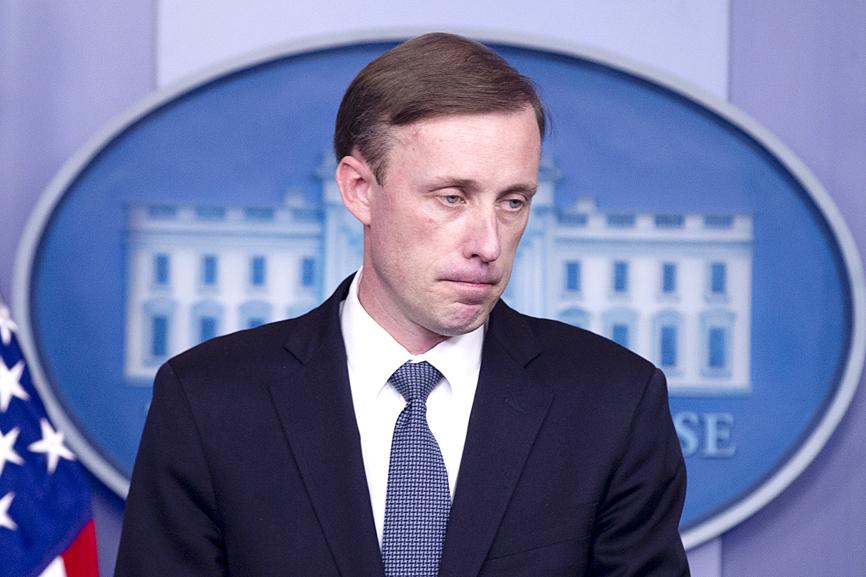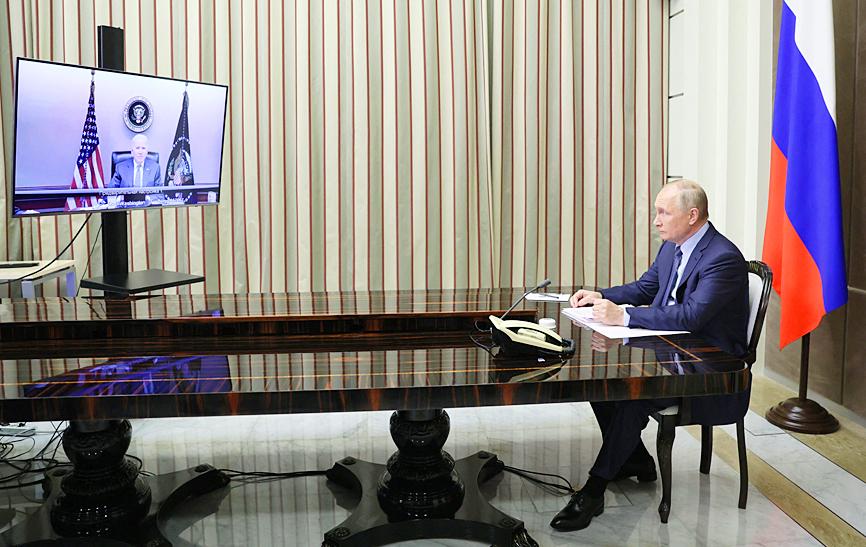The US “will take every action” in diplomacy and deterrence to prevent the forcible unification of Taiwan by China in concurrence with a hypothetical Russian invasion of Ukraine, US National Security Adviser Jake Sullivan said on Tuesday.
Sullivan made the comment at a White House news conference following a teleconference between US President Joe Biden and Russian President Vladimir Putin earlier that day over the military standoff between Russia and Ukraine.
A reporter asked: “Some observers have described a nightmare scenario where President Putin invades Ukraine and also, simultaneously, President Xi [Jinping, 習近平] uses force to ‘reunify’ Taiwan with China. Is the US prepared to deal with such a scenario?”

Photo: EPA-EFE
“The United States is going to take every action that we can take, from the point of view of both deterrence and diplomacy, to make sure that the Taiwan scenario you just described never happens and to try to avert the invasion and deter the invasion into Ukraine,” Sullivan said.
“The sum total of the efforts we have undertaken over the course of the past eight months in the Indo-Pacific have also all been geared towards avoiding any kind of scenario where China chooses to invade,” he said.
Biden and Putin were still far apart after their two hours of talks on a crisis caused by Moscow massing of tens of thousands of troops near the border with Ukraine.

Photo: AFP
Biden delivered a simple message: Invade Ukraine again and face painful sanctions that will do resounding harm to your economy.
Putin had his own blunt take, telling the US president that “the Russian troops are on their own territory, and they don’t threaten anyone,” said Yuri Ushakov, who advises Putin on foreign affairs.
With no immediate breakthrough to ease tensions on the Ukraine question, the US emphasized a need for diplomacy and de-escalation, while issuing stern threats to Russia about the high costs of a military incursion.
Biden “told President Putin directly that if Russia further invades Ukraine, the United States and our European allies would respond with strong economic measures,” Sullivan said.
Biden told Putin that the US would also “provide additional defensive material to the Ukrainians ... and we would fortify our NATO allies on the eastern flank with additional capabilities in response to such an escalation,” Sullivan said.
White House officials said that Biden is not interested in sending US troops to defend Ukraine.
However, Sullivan said that potential efforts to bolster regional allies could lead to additional deployments of troops to eastern European NATO allies.
Ushakov dismissed the sanctions threat during his own comments to reporters following the leaders’ meeting.
“While the US president talked about possible sanctions, our president emphasized what Russia needs,” Ushakov said. “Sanctions aren’t something new, they have been in place for a long time and will not have any effect.”
He described the presidents’ video conference as “candid and businesslike,” adding that they also exchanged occasional jokes.
In a brief snippet of the start of their meeting that was broadcast by Russian state television, the two leaders offered friendly greetings to each other.
“I welcome you, Mr President,” Putin said, speaking with a Russian flag behind him and a video monitor showing Biden in front of him.
At the White House, Sullivan called it “a useful meeting,” allowing Biden to lay out in candid terms where Washington stands.
Sullivan said that Biden and Putin had a “good discussion” on efforts to prevent Iran from becoming a nuclear power and called it an area where the two countries could cooperate.
“The more Iran demonstrates a lack of seriousness at the negotiating table,” the more there will be a sense of unity among the US and the parties to the 2015 nuclear accord, including Russia and the EU, he said.
Additional reporting by staff writer

INVESTIGATION: The case is the latest instance of a DPP figure being implicated in an espionage network accused of allegedly leaking information to Chinese intelligence Democratic Progressive Party (DPP) member Ho Jen-chieh (何仁傑) was detained and held incommunicado yesterday on suspicion of spying for China during his tenure as assistant to then-minister of foreign affairs Joseph Wu (吳釗燮). The Taipei District Prosecutors’ Office said Ho was implicated during its investigation into alleged spying activities by former Presidential Office consultant Wu Shang-yu (吳尚雨). Prosecutors said there is reason to believe Ho breached the National Security Act (國家安全法) by leaking classified Ministry of Foreign Affairs information to Chinese intelligence. Following interrogation, prosecutors petitioned the Taipei District Court to detain Ho, citing concerns over potential collusion or tampering of evidence. The

‘FORM OF PROTEST’: The German Institute Taipei said it was ‘shocked’ to see Nazi symbolism used in connection with political aims as it condemned the incident Sung Chien-liang (宋建樑), who led efforts to recall Democratic Progressive Party (DPP) Legislator Lee Kun-cheng (李坤城), was released on bail of NT$80,000 yesterday amid an outcry over a Nazi armband he wore to questioning the night before. Sung arrived at the New Taipei City District Prosecutors’ Office for questioning in a recall petition forgery case on Tuesday night wearing a red armband bearing a swastika, carrying a copy of Adolf Hitler’s Mein Kampf and giving a Nazi salute. Sung left the building at 1:15am without the armband and apparently covering the book with a coat. This is a serious international scandal and Chinese

Seventy percent of middle and elementary schools now conduct English classes entirely in English, the Ministry of Education said, as it encourages schools nationwide to adopt this practice Minister of Education (MOE) Cheng Ying-yao (鄭英耀) is scheduled to present a report on the government’s bilingual education policy to the Legislative Yuan’s Education and Culture Committee today. The report would outline strategies aimed at expanding access to education, reducing regional disparities and improving talent cultivation. Implementation of bilingual education policies has varied across local governments, occasionally drawing public criticism. For example, some schools have required teachers of non-English subjects to pass English proficiency

TRADE: The premier pledged safeguards on ‘Made in Taiwan’ labeling, anti-dumping measures and stricter export controls to strengthen its position in trade talks Products labeled “made in Taiwan” must be genuinely made in Taiwan, Premier Cho Jung-tai (卓榮泰) said yesterday, vowing to enforce strict safeguards against “origin laundering” and initiate anti-dumping investigations to prevent China dumping its products in Taiwan. Cho made the remarks in a discussion session with representatives from industries in Kaohsiung. In response to the US government’s recent announcement of “reciprocal” tariffs on its trading partners, President William Lai (賴清德) and Cho last week began a series of consultations with industry leaders nationwide to gather feedback and address concerns. Taiwanese and US officials held a videoconference on Friday evening to discuss the